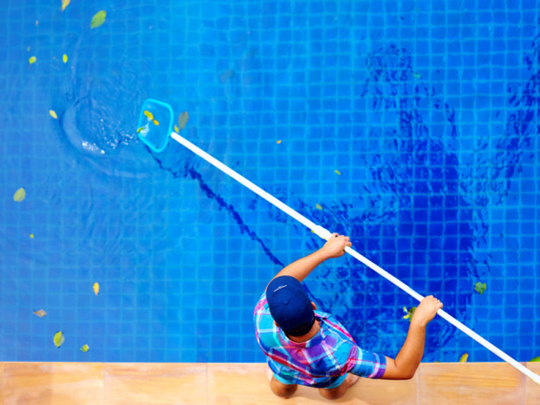
As the mercury soars, many of us will be struggling to get our swimming pools up and ready to have some respite from the summer heat. Residents can do a lot to avoid health and safety issues and keep their pools at their optimum best in time for the summer months.
Trust the professionals
“Sometimes you need to trust an expert, especially when it comes to your pool’s mechanical equipment — pumps, filters, heating and cooling systems,” advises James Day, director of Hitches and Glitches. “You may not have the proper knowledge to maintain your pool. At least three times a year, have a pool service professional come and check your mechanical devices.”
Before calling in a professional team, it pays to thoroughly check your pool and draw up a list of potential issues, whether physical or functional.
“Compile a list of any issues you have seen or heard such as leaky pipes, and any odd sound or smell,” says Day. “Mention them to your service crew to give them an idea of where to start.”
Do it yourself
While having a maintenance contract with a professional pool service company is advisable, for those that like to get their hands dirty or have budgetary constraints, there are several do-it-yourself (DIY) tips available. However, experts say when repairing vinyl, tiles or pool equipment such as filters and water pumps, only a professional pool maintenance company should be brought in to ensure safety and health standards.
“Cracks in your pool’s tile wall or tears in its vinyl liner can cause major problems,” says Vijay Kavasseri, general manager of Mplus Home Maintenance Services. “Inspect your pool for blemishes and contact a professional if you notice an issue.”
Here are some of the important areas to monitor to keep swimming pools clean, maintained and ready for summer:
Filter: The filter is the most important component of maintaining pool health. Whether checking filter pressure or dirt clogs, filters need proper care to ensure pools function effectively.
“You must check your filter pressure. Your filter’s pressure gauge is located on top of the unit itself,” says Kavasseri. “If you’re unsure of your filter’s ideal pressure, check your owner’s manual or call the manufacturer. Also, check the pool filter for dirt. Dirty filters lead to dirty pool water. If your filter is looking unkempt, use a hose to spray it down.”
Debris check: This is especially true during autumn when leaves shed easily. Also, a periodic check of debris prevents build-up and clogging issues in the pool strainer.
“One of the most basic elements of maintaining a healthy pool is keeping the water and equipment free of leaves and other debris,” explains Day. “You should check your pool every two or three days to remove these from the surface of the pool and from the bottom.”
While it would be wise to invest in a long-handled pool net that makes surface debris removal easy even from the deck, for debris on the bottom, a long brush could be a useful tool. Special alerts are advised for days following sandstorms, a common phenomenon in Dubai.
“Make sure to check the pool following a sandstorm, high winds or rain,” says Day. “There’s a possibility of more leaves and branches being deposited into the water. Take a look into the filter area, as leaves can obstruct the filter system.” It’s also important to keep strainer baskets free from sticks, leaves and other clutter.
Chlorine alert: Chlorine levels are by far the most critical pool safety concern. Kavasseri recommends pool owners to invest in a test kit to monitor the water during the peak summer months.
“Test your chlorine levels regularly,” he says. “Chlorine kills contaminants like algae and harmful bacteria. But high chlorine levels can also cause burns and other skin irritations. Check your chemical levels daily to ensure your pool water is safe.”
Water that looks murky or gives off an odour is a sign of unbalanced chemical levels. “Chemical levels are arguably one of the most important facets of pool maintenance,” says Day. “Improperly balanced water looks murky, irritates skin and eyes and can cause your pool to become a breeding ground for bacteria. When all the chemicals are properly balanced, your swimming pool water should be crystal clear, have no scent, and leave very little residue on your skin.”
Scrub, scrub, scrub: There is no shortcut to the good old scrubbing to keep pools pristine clean. Pool walls, tiles, floor and deck need special attention to avoid bacterial build-ups and stains. Kavasseri suggests using a thick-bristled brush to scrub away any build-up.
“Algae, mineral build-up and sunscreen can leave unsightly stains around your pool,” he says. “Tile lines can be cleaned with baking soda and a sponge if you do not have any pool tile cleaner. Do not use any household cleaners, especially abrasives, to clean the tile. You do not want to swim in these chemicals!”
Vacuuming: Vacuuming helps get rid of any build-up at the bottom of the pool. Suggested once a week, the vacuuming process takes between 30-60 minutes depending on the size of pool. Explaining the correct procedure for vacuuming, Day says, “Move across the pool in an overlapping motion. If the pool is too wide for a complete full pass, vacuum half the pool from each side.”
Since the vacuum equipment is tricky to operate, he advises caution and a strict adherence to manufacturer guidelines to prevent any damage to the pool pump system or yourself. It is advisable to clean tools and equipment thoroughly after using to avoid bacteria forming on them when stored.
Whether using DIY tips or professional experts, your pool needs your care and attention to keep you cool during summer.











